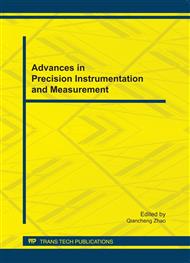p.205
p.209
p.214
p.219
p.225
p.229
p.234
p.240
p.246
The Research Based on Empirical Mode Decomposition in Bearing Fault Diagnosis
Abstract:
Comparing with many modern signal processing methods in the bearing fault diagnosis, Hilbert-Huang transform is proposed which has good resolving power, and is adapt to process non-stationary, nonlinear and no cross-interference signals. Experimental bearing vibration signals have been analyzed by using this method, whose impulse response waveform was effectively separated from the signals. The results show that the sensitivity and reliability of the method are satisfactory.
Info:
Periodical:
Pages:
225-228
DOI:
Citation:
Online since:
September 2011
Authors:
Price:
Сopyright:
© 2012 Trans Tech Publications Ltd. All Rights Reserved
Share:
Citation:


